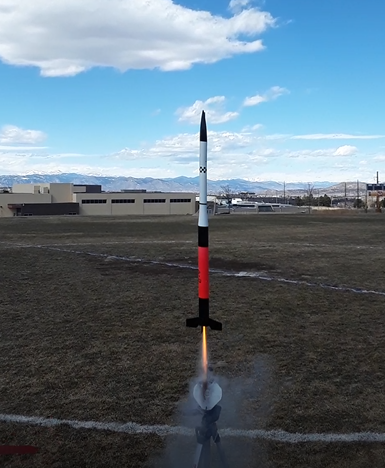Sunday, the 8th, I found myself with a spare hour in the early afternoon along with some very nice weather outside.
Time to fly a couple rockets!
For this session, I wanted to test fly the recently acquired Estes Altimeter, so I quickly packed up the launch gear and selected my weapon of choice: the Estes Delta 2 from the old feet days. The model, built in 1980, is one of the two models from that era that I still have. I don't fly the Astrocam 110, so a new custom payload section was built to fly atop the booster.
On my way out, I saw my neighbor across the street out playing ball with his two young sons, so I invited them to come along.
The flying field of choice - Douglas County High School - is only a half mile away, so things were set up and ready to go in no time.
The altimeter rode in a BT -50 payload bay that was cobbled together from some spare parts.
The first flight of the Delta, launched by one of the boys, was picture perfect on a B6-4 motor.
It was one of those rare flights where the model drifts back and lands right next to the launch pad!
A quick check of the altimeter showed a flight of over 700 feet...
OK, this is Castle Rock, Colorado, 6,222 feet above sea level, but there is no way the bird went that high. Just from watching the flight, I had estimated no more than 300 feet.
I must have done something wrong with the altimeter.
I conducted a little experiment: re-setting the unit to zero, I inserted it into the payload bay and installed the nose cone quickly while blocking the vent holes with my fingers.
Sure enough, the action created enough pressure for the altimeter to record 175 feet.
Aha... I must have done a similar thing while prepping the altimeter for its first flight.
Lesson learned.
I quickly prepped the Delta for a second flight, this time on a C6-5. I don't normally try C motors on a relatively small field like this one, but conditions were calm enough that there were no worries about getting the model back.
This would be the Delta 2's thirteenth launch.
I made sure to prep the altimeter more carefully, so that there were no pressure changes induced from nose cone insertion.
The model boosted for another great flight, this time landing at the perimeter of the field, and recovered by my crack crew of neighbor kids.
This time the altimeter read a little over 600 feet, which was well in line with what was visually observed.
Having satisfied the rocket flying bug, I packed up to head home.
My guests were entirely impressed, so I'm hoping that this launch session might perhaps spark the formation of some new rocketeers.
I resolve, on my next flying session, to launch the altimeter several times using the same rocket and motor type so that I can establish altitude recording consistency. I have a number of altitude-based projects in the queue for this flying season that will require the utmost in accuracy.
Cheers!



